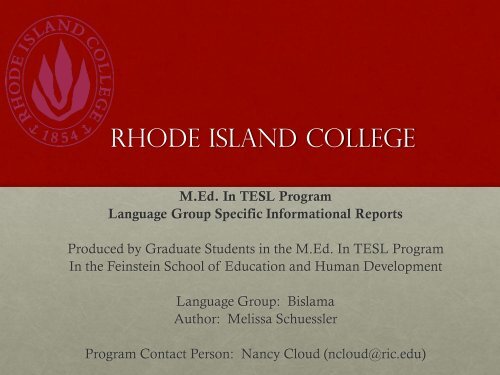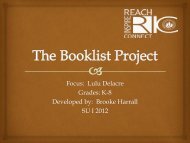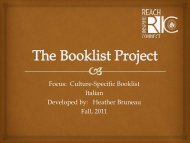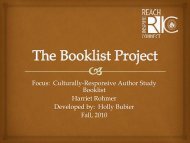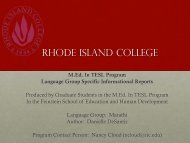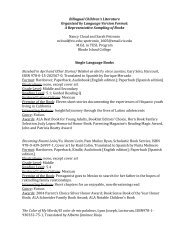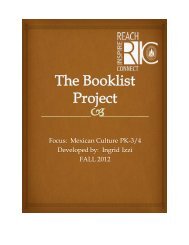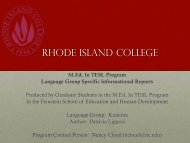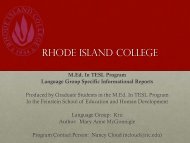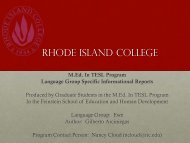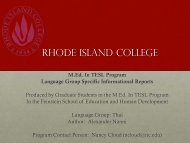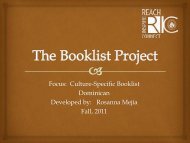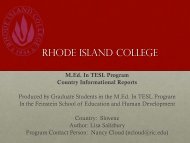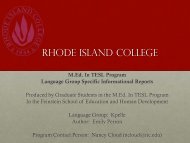Bislama Informational Report - RITELL
Bislama Informational Report - RITELL
Bislama Informational Report - RITELL
Create successful ePaper yourself
Turn your PDF publications into a flip-book with our unique Google optimized e-Paper software.
<strong>Bislama</strong> is a Dialect of:•Melanesian PidginSome other dialects of Melanesian Pidgin are:• Tok Pisin, spoken in Papua New Guinea• Pijin, spoken in the Solomon Islands• Only in Vanuatu is the language of <strong>Bislama</strong> declaredby the constitution to be the national language.Source: http://www.hawaii.edu/satocenter/langnet/definitions/bislama.html
Vocabulary:• The major lexifier for <strong>Bislama</strong> is English, with words such as brijfor ‘bridge’ and buluk for ‘cow’ (from bullock).• Some of the words of English origin in <strong>Bislama</strong> are archaic, forexample: masket for ‘rifle’ (from “musket”).• Some words are stylistically restricted, for example: puskat for‘cat’ (from “pussy cat”).• Other words of English origin have meanings which are modeledmore on what is found in local Oceanic languages, such as han,which means both ‘hand’ and ‘arm’, while leg means both ‘foot’and ‘leg’.• However, there are a number of common words of French originin <strong>Bislama</strong> as well, such as kabine, ‘toilet’ (from cabinet) andpima, ‘chili’ (from “piment”).Source: www.hawaii.edu/satocenter/langnet/definitions/bislama.html
<strong>Bislama</strong> alphabet and pronunciationSample text in <strong>Bislama</strong>:Evri man mo woman i bon fri mo ikwol long respek mo ol raet.Translation:All human beings are born free and equal in dignity and rights.www.omniglot.com/writing/bislama.php
http://www.youtube.com/watch?v=CFtjckSDoFY&Feature=relatedhttp://www.youtube.com/watch?v=2wVHk48HiP8&feature=related
Phonology: Consonants• The consonants we find in most people’s <strong>Bislama</strong> are: p, t, k, b, d, g,m, n, ng, f, v, s, h, l, r, y, w, also the sound we write as ‘ch’ is written asj.• They lack certain fricatives which occur in English, like 'th' 'sh'.• There is often no contrast between p and b, t and d, k and g, f and v,and s and z.• The majority allow open syllables only, and very few allow finalsyllables to be closed by more than one consonant. Because of thisthey have frequent omission of past tense when speaking English.For example, they would say:This office is close from 12:00 to 1:00.They should have lock the door.I am very concern about the problem.http://www.hawaii.edu/satocenter/langnet/definitions/bislama.html,http://www.bosconet.aust.com/com/pacific_english.htm#syn
Phonology: Vowels• There are only 5 vowels in <strong>Bislama</strong>: i e a o u• Other vowels in English are generally adapted to thenearest equivalent vowel in <strong>Bislama</strong>, so a word like 'burn' inEnglish is pronounced as bon.• For many <strong>Bislama</strong> speakers English can be difficult becausecontrast between long and short vowels is not made.For example: It is difficult for Ni-Vanuatu to distinguish thedifference between the ‘a’ in “apple” vs. the ‘a’ in “ape”.http://www.bosconet.aust.com/com/pacific_english.htm,http://www.hawaii.edu/satocenter/langnet/definitions/bislama.html
Semantics:• When you want to say that something (or somebody) is something else,there is no verb meaning “be” in <strong>Bislama</strong>, and the words describing the twothings are placed one after the other, as in:Mi tija. ‘I am a teacher.’Yu hanggre. ‘You are hungry’.• When the first part of the sentence is a noun or a pronoun other than mi oryu, the second part of the sentence will be separated from the first part bythe small word i, as in:Tomson i hanggre. ‘Thompson is hungry.’Mifala i bos. ‘We are the bosses.’• Because of these rules in the language, it can be difficult for the people ofVanuatu to learn and remember that there must be the verb “to be”connecting certain nouns to other words.• They also have to learn how and when to conjugate the verb “to be” whichcan be difficult to master when you are not used to doing this.http://www.bosconet.aust.com/com/pacific_english.htmhttp://www.hawaii.edu/satocenter/langnet/definitions/bislama.html
Intonation• Nobody has really tried seriously to study theintonation pattern of <strong>Bislama</strong>, but it certainly seems tohave a unique melody involving an unusual rise andfall of the voice while speaking.• There seems to be a distinct intonation in <strong>Bislama</strong>when compared to other Melanesian Pidgins.http://www.hawaii.edu/satocenter/langnet/definitions/bislama.html
Common mistakes in <strong>Bislama</strong> language:• Use of non-count nouns as count nouns:‘We need more furnitures in this office.’‘She had to go and have a surgery.’• Singular noun following ‘one of’:‘One of my friend will bring it.’‘Vanuatu is one of the nicest country I have been to.’• Pronominal copy after an overt subject noun phrase:‘John he was sick yesterday.’‘The boys they were playing football.’• Been as a pre-verbal past tense marker:‘I been study all week.’‘He been swear at me.’http://www.bosconet.aust.com/com/pacific_english.htm#syn
<strong>Bislama</strong> Communication Styles• The people of Vanuatu are very friendly, and the last thing they want to dois offend or upset you. However, this can sometimes hindercommunication a bit.• If you need help finding something or getting information, you should askan open-ended question.For example: let's say that I wanted to find the market, but I wasn't sure if I was going the rightway. Instead of asking a "yes" or "no" question like, "Is this the way to the market?" I would say,"How do I get to the market?"If you ask a "yes" or "no" question, you will get a "yes" answer nine times out of ten, even ifthat's not the real answer. This is because the Vanuatu people are afraid to disagree with youbecause they feel that they might offend you.• Ni-Vanuatu people are very polite. They are forever thanking each otherand greeting each other, even when they drive down the road the wave ateach other and beep to say hello!“Tankyu Tumas” means thanks very much and they are forever saying it.http://www.virtualtourist.com/travel/Australia_and_Oceania/Vanuatu/Local_Customs-Vanuatu-TG-C-1.html
ResourcesBooksGraddol, D., Leith, D., & Swann, J. (1996) English: History, diversity, and change. New York:Routledge.Swan, M., & Smith, B. (2001) Learner English : A teacher’s guide to interference andproblems. Second edition. New York: Cambridge University Press.Internet SitesAger, S. (2012). <strong>Bislama</strong> language. Omniglot: Writing systems and languages of the world.Retrieved March 15, 2011, from: http://www.omniglot.com/writing/bislama.phpCrowley, T. (n.d.). <strong>Bislama</strong> (Vanuatu). Language varieties. Retrieved March 15, 2011, from:http://www.hawaii.edu/satocenter/langnet/definitions/bislama.html
Resources ContinuedMugler, F., & Lynch, J. (2001). What is happening to English in the South Pacific? SouthPacific Language. Retrieved March 20, 2011, from:http://www.bosconet.aust.com/com/pacific_english.htm#synVirtual Tourist. (2012).Vanuatu local customs. Virtual tourist: The people behind the places.Retrieved March 20, 2011, from:http://www.virtualtourist.com/travel/Australia_and_Oceania/Vanuatu/Local_Customs-Vanuatu-TG-C-1.htmlMapsWorld Atlas Graphic Maps. Map of Vanuatu [Map], Retrieved on March 14, 2011, from:http://www.worldatlas.com/webimage/countrys/oceania/vu.htmVideoVocalNationalAnthems. (2010, May 7). Yumi Yumi Yumi: Vanuatu National anthem vocal,You Tube [Video file], Retrieved on March 14, 2011, from:http://www.youtube.com/watch?v=2wVHk48HiP8&feature=related
M.Ed. in TESL ProgramNancy Cloud, DirectorEducational Studies DepartmentRhode Island College, HBS 206 #5600 Mt. Pleasant AvenueProvidence, RI 02908Phone (401) 456-8789Fax (401) 456-8284ncloud@ric.eduThe M.Ed. in TESL Program at Rhode Island Collegeis Nationally Recognized by TESOL and NCATE


